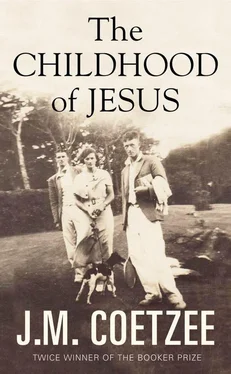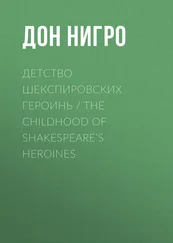‘Yes. And while you are about it, write to that señor León too. Ask him what is he doing, teaching small children. Tell him it’s not a job for a man.’
‘Esteemed señor León,’ he writes.
Thank you for introducing us to señora Otxoa.
Señora Otxoa has proposed that our son David be transferred to the special school at Punto Arenas.
On mature consideration we have decided against such a move. David is, in our judgment, too young to live away from his parents. We also doubt that he will receive the right kind of attention at Punto Arenas. We will therefore proceed with his schooling at home. We have every hope that his learning difficulties will soon be a thing of the past. He is, as you concede, a bright child who learns quickly.
We thank you for your efforts on his behalf. We enclose a copy of the letter we have sent your school principal notifying him of the withdrawal.
They receive no reply. Instead, there arrives in the mail a three-page form to be filled in for admission to Punto Arenas, plus a list of clothing and personal items (toothbrush, toothpaste, comb) that a new pupil should bring, and a bus pass. All of this they ignore.
Next comes a telephone call, from neither the school nor Punto Arenas, but, as far as Inés can make out, from some administrative office or other in the city.
‘We have decided not to send David back to school,’ she informs the woman on the line. ‘He was getting no benefit from the teaching. He will be learning at home.’
‘It is permitted to educate a child at home only if the parent is an accredited teacher,’ says the woman. ‘Are you an accredited teacher?’
‘I am David’s mother, and I and no one else will decide how he is to be educated,’ replies Inés, and puts down the receiver.
A week later there arrives a new letter. Headed ‘Notice of Tribunal’ it instructs the unnamed ‘parent(s) and/or guardian(s)’ to appear before a board of investigation on February 21st at 9 a.m., to show cause why the child in question should not be transferred to the Special Learning Centre at Punto Arenas.
‘I refuse,’ says Inés. ‘I refuse to attend their tribunal. I am going to take David away to La Residencia and keep him there. If anyone asks where we are, say we have gone up-country.’
‘Please think again, Inés. If you do that, you will be turning yourself into a fugitive. Someone or other at La Residencia — that officious porter, for example — will report you to the authorities. Let us appear before this board, you and David and I. Let them have a chance to see that the boy doesn’t have horns, that he is just an ordinary six-year-old, far too young to be separated from his mother.’
‘This is no longer a game,’ he warns the boy. ‘If you don’t persuade these people that you are willing to learn, they are going to send you away to Punto Arenas and the barbed wire. Fetch your book. You are going to learn to read.’
‘But I can read,’ says the boy patiently.
‘You can only read in your nonsense way. I am going to teach you to read properly.’
The boy trots out of the room, returns with his Don Quixote , and opens it to the first page. ‘Somewhere in La Mancha,’ he reads, slowly but confidently, giving each word its proper weight, ‘in a place whose name I do not recall, lived a gentleman who owned a scrawny nag and a dog.’
‘Very good. But how do I know you haven’t learned that passage by heart?’ He chooses a page at random. ‘Read.’
‘God knows whether there is a Dulcinea in this world or not,’ reads the boy, ‘whether she is fatansical or not fatansical.’
‘Fantastical. Go on.’
‘These are not things that can be proved or disproved. I neither engendered nor gave birth to her. What is engendered?’
‘Don Quixote is saying that he is neither the father nor the mother of Dulcinea. Engendering is what the father does to help make the baby. Go on.’
‘I neither engendered nor gave birth to her, but I venerate her as one should venerate a lady who has virtues that make her famous through all the world. What is venerate?’
‘Venerate is worship. Why didn’t you tell me you could read?’
‘I did tell you. You wouldn’t listen.’
‘You pretended you couldn’t. Can you write too?’
‘Yes.’
‘Get your pencil. Write down what I read to you.’
‘I haven’t got a pencil. I left my pencils at school. You were going to save them. You promised.’
‘I haven’t forgotten.’
‘For my next birthday can I have a horse?’
‘You mean a horse like El Rey?’
‘No, a little horse that can sleep in my room with me.’
‘Be sensible, child. You can’t keep a horse in an apartment.’
‘Inés keeps Bolívar.’
‘Yes, but a horse is much bigger than a dog.’
‘I can get a baby horse.’
‘A baby horse will grow into a big horse. I will tell you what. If you are good, and show señor León you belong in his class, we will get you a bicycle.’
‘I don’t want a bicycle. You can’t save people on a bicycle.’
‘Well, you are not getting a horse, so that is the end of that. Write down: “God knows whether there is a Dulcinea in this world or not.” Show me.’
The boy shows him his exercise book. Deos sabe si hay Dulcinea o no en el mundo , he reads: the line of words marches steadily from left to right; the letters are evenly spaced and perfectly formed. ‘I am impressed,’ he says. ‘One small point to note: in Spanish God spells his name Dios , not Deos . Otherwise, very good. First class. So you could read and write all the time, and you were just playing a trick on your mother and me and señor León.’
‘I wasn’t playing a trick. Who is God?’
‘ God knows is an expression. It is a way of saying no one knows. You can’t —’
‘Is God no one?’
‘Don’t change the subject. God is not no one, but he lives too far away for us to converse with him or have dealings with him. As for whether he notices us, Dios sabe . What are we going to tell señora Otxoa? What are we going to tell señor León? How are we going to explain to them that you were playing the fool with them, that you knew how to read and write all the time? Inés, come here! David has something to show you.’
He passes the boy’s exercise book to her. She reads. ‘Who is Dulcinea?’ she asks.
‘It doesn’t matter. She is a woman Don Quixote is in love with. Not a real woman. An ideal. An idea in his mind. Look how well he has made the letters. He could write all the time.’
‘Of course he can write. He can do anything — can’t you, David? You can do anything. You are your mother’s boy.’
With a big and (it seems to him) rather self-satisfied smile on his face, David clambers onto the bed and extends his arms to his mother, who sweeps him up in her embrace. His eyes close; he withdraws into bliss.
‘We are going back to the school,’ he announces to the boy, ‘you and Inés and I. We are going to take Don Quixote along. We are going to show señor León that you can read. Once we have done that, you are going to tell him how sorry you are for having caused all this fuss.’
‘I’m not going back to school. I don’t need to. I can already read and write.’
‘The choice is no longer between going to señor León’s school and staying at home. The choice is between señor León’s school and the barbed-wire school. Besides, school isn’t just about reading and writing. It is also about learning to get on with other boys and girls. It is about becoming a social animal.’
‘There aren’t any girls in señor León’s class.’
‘Yes. But you meet girls during the breaks and after school.’
Читать дальше












